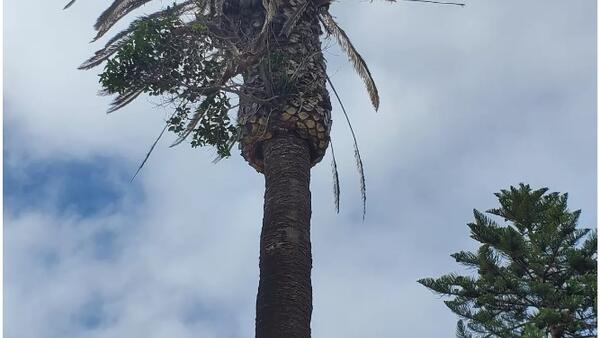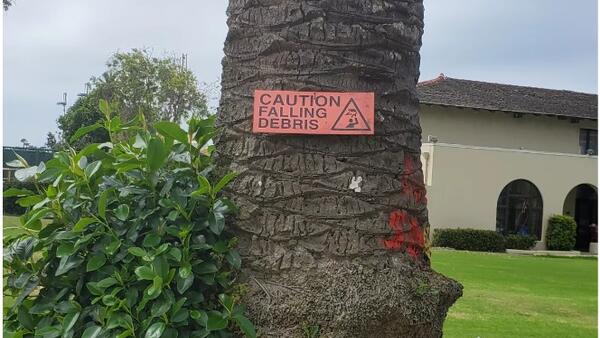A palm tree on the La Jolla Recreation Center grounds is slated for removal after the city of San Diego confirmed it has been infested with the South American palm weevil.
The palm weevil — a type of beetle native to parts of Mexico, Central and South America and the Caribbean — has killed many trees in La Jolla in the past few years.

the South American palm weevil and will be removed. (Ashley Mackin-Solomon)
San Diego spokesman Benny Cartwright told the La Jolla Light that the city’s arborist has determined the tree at the Recreation Center “is safe, and removal is being scheduled following standard protocols.”
A schedule for the removal was not immediately available.
Signatures of a weevil infestation are drooping fronds and a collapsed or tilting crown that turns brown in an umbrella-like appearance, according to Mark Hoddle, a biological control specialist and principal investigator at the UC Riverside Department of Entomology.
With those hallmarks visible, a sign was affixed to the Rec Center tree — beside the lawn that faces Draper Avenue and Prospect Street and the nearby bocce court — cautioning people of the risk of falling limbs.
The sign was placed “as a precautionary measure,” Cartwright said.
Hoddle previously told the Light that palm weevil infestation works in a cycle in which the bug will colonize palm trees, attracting other weevils “by releasing an aggregation pheromone that calls in other flying weevils to the palm.”

possibility of falling limbs ahead of the tree’s removal. (Ashley Mackin-Solomon)
“Once at the palm, females lay eggs; those eggs hatch into weevil grubs or larvae that feed on the palm heart,” he said. “Once the larval stage is completed, the larvae form cocoons out of palm fibers within which they pupate. After pupation is complete, the adult weevils emerge and the cycle repeats itself.”
Once an infestation happens, he said, “often [the tree] can’t recover because the damage is so severe. Even if insecticides are applied, if damage is heavy, it may be irreversible; the palm can’t recover even if weevil larvae are killed off.”
While some protective measures are possible — such as early and continued use of insecticide — Cartwright said he could not confirm whether those measures are being taken at other trees on the Rec Center property.
Eric Middleton, an area integrated pest management adviser for the University of California system who is studying the weevils, looked at photos of the La Jolla Rec Center tree and said it is “definitely dead.”
Middleton and his colleagues are looking at the biology of the insect, how to trap and kill it without damaging the trees and even whether bringing in a predator might be an option. However, he said he has no update on the status of the work.
“I will be meeting with some colleagues this fall for a seminar on current management strategies,” Middleton said.